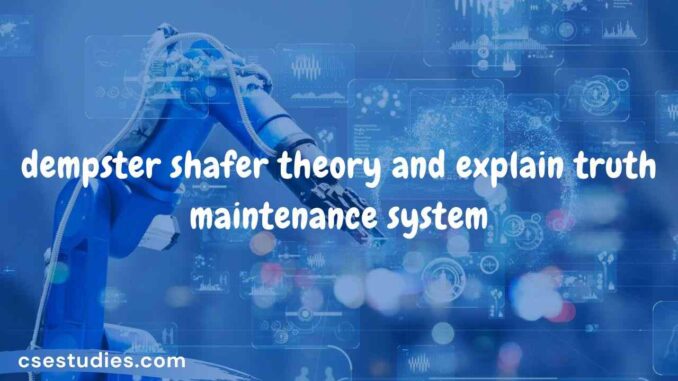
The Dempster-Shafer theory, also known as the theory of belief functions or evidence theory, and the Truth Maintenance System (TMS) are two important concepts in artificial intelligence. Let’s understand the need for the Dempster-Shafer theory and explore the Truth Maintenance System:
Dempster-Shafer Theory in AI:
- Dempster-Shafer Theory:
- The Dempster-Shafer theory addresses the limitations of classical probability theory in situations where uncertainty and incomplete information are prevalent.
- Classical probability theory assumes that probabilities can be assigned to events with complete certainty, but in real-world scenarios, there may be ambiguity, imprecise data, or conflicting evidence.
- The Dempster-Shafer theory provides a framework to reason and make decisions under uncertainty by representing and combining evidence from multiple sources in a principled manner.
- It allows for the representation of beliefs, degrees of belief, and the assessment of the overall uncertainty associated with different hypotheses or propositions.
- The Dempster-Shafer theory is particularly useful in applications involving information fusion, decision-making, risk assessment, and expert systems where uncertainty and incomplete knowledge exist.
Truth Maintenance System (TMS) in AI
- Truth Maintenance System (TMS):
- A Truth Maintenance System (TMS) is a mechanism used in AI systems to manage and track the consistency of knowledge and beliefs.
- In complex knowledge-based systems, inconsistencies may arise due to changes in the underlying knowledge base or the inference process.
- A TMS helps maintain the consistency of beliefs by detecting and managing inconsistencies and providing mechanisms for conflict resolution.
- TMS keeps track of dependencies between facts, rules, and beliefs, allowing for the identification of inconsistencies and their resolution through backtracking, retraction of beliefs, or revision of the knowledge base.
- TMS also facilitates efficient and incremental reasoning by minimizing the computational overhead associated with reevaluating the entire knowledge base when changes occur.
- TMS is especially useful in systems that involve a large and evolving knowledge base, complex rule systems, or dynamic environments where beliefs and facts can change over time.
The Dempster-Shafer theory addresses the challenges of reasoning under uncertainty and incomplete information, providing a principled framework for combining evidence and assessing belief degrees. It is valuable in applications where ambiguity and conflicting evidence are present.
On the other hand, the Truth Maintenance System is crucial for maintaining the consistency and integrity of knowledge in complex AI systems, ensuring that beliefs and facts remain coherent despite changes or updates to the knowledge base. TMS helps manage inconsistencies and supports efficient reasoning and decision-making processes. Together, these concepts contribute to the development of robust and reliable AI systems capable of dealing with uncertainty and maintaining knowledge consistency.